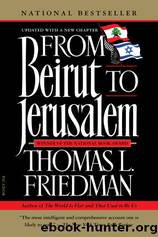From Beirut to Jerusalem by Friedman Thomas L

Author:Friedman, Thomas L. [Friedman, Thomas L.]
Language: eng
Format: epub
Tags: History, Politics, War, Travel
ISBN: 9780374706999
Goodreads: 10968904
Publisher: Farrar, Straus and Giroux
Published: 1989-06-01T07:00:00+00:00
If Israel wasnât founded on the basis of such a fatalistic outlook, then how did it take over?
The motto of Theodor Herzl, the Austrian journalist considered to be the founding father of Zionism, embodied the spirit of choice and initiative he hoped to instill in the Jewish people. âIf you will it,â said Herzl, âthen it is no dream.â
The first Jewish kibbutz collective farm built by the Zionist pioneers in 1909, Degania, was a monument to that motto. In the early years of the state of Israel it was common for native-born Israelis to feel contempt for the Jews who died in the Holocaust, and even for some of those who survived, because they were viewed as sheep who simply went off to slaughter, while the Zionists were men of bold initiative, who went out and fought the British and the Arabs and built a Jewish state.
Ruth Firer, a researcher at the Hebrew University School of Education and a specialist in the teaching of the Holocaust in Israeli high schools, recalled the spirit of those early days. Firer was born in Siberia, where her Polish parents were exiled by the Russians during World War II. Thanks to this exile, her immediate family survived the Holocaust, but all her parentsâ relatives were wiped out. In 1949, her father brought the family to Israel.
âWhen I was a student here in the 1950s, the Holocaust was a family secretâa shame,â Firer explained one afternoon over coffee in her Jerusalem apartment. âIn those days, we barely learned about the Holocaust in school. The feeling, the whole atmosphere, was that the future must triumph over the past. All of us, parents and kids, tried to cover up what had happened. When we taught the Holocaust then, we taught the heroism of the Warsaw Ghettoâthat was it.â
Unfortunately, a succession of traumatic events conspired to reawaken in every Israeliâs soul the spirit of the Holocaust and everything it represented in Jewish history. In the process, Israelâs motto changed from Herzlâs âIf you will it, then it is no dreamâ to âKacha, Ma Laasot?ââwhich means âThat is how things are, what can we do?â In other words, the future is fixed: a permanent struggle for survival against a hostile world.
The change began, I believe, with the trial of Nazi war criminal Adolf Otto Eichmann in 1961, which brought both the Holocaust and the survivors out of the Israeli closet. Older people were forced to reexamine their feelings, and the new generation of Israelis, who intently followed the gripping testimony of the survivors, developed an interest in this previously unmentionable chapter in the family album.
âFor the first time in public the stories of the survivors came out and were legitimized,â said Firer. âEvery day people heard in the court and read in the papers the stories of the survivors. They were no longer seen as sheep led to slaughter. It turned out that many of them resisted, many of them were heroesâheroes we Israelis could understand. Theirs was a fight to survive and we could honor it.
Download
This site does not store any files on its server. We only index and link to content provided by other sites. Please contact the content providers to delete copyright contents if any and email us, we'll remove relevant links or contents immediately.
| Bahrain | Egypt |
| Iran | Iraq |
| Israel & Palestine | Jordan |
| Kuwait | Lebanon |
| Oman | Qatar |
| Saudi Arabia | Syria |
| Turkey | United Arab Emirates |
| Yemen |
Empire of the Sikhs by Patwant Singh(23062)
The Wind in My Hair by Masih Alinejad(5077)
Rise and Kill First by Ronen Bergman(4763)
The Templars by Dan Jones(4672)
The Rape of Nanking by Iris Chang(4191)
12 Strong by Doug Stanton(3539)
Blood and Sand by Alex Von Tunzelmann(3181)
Babylon's Ark by Lawrence Anthony(2661)
The History of Jihad: From Muhammad to ISIS by Spencer Robert(2614)
No Room for Small Dreams by Shimon Peres(2355)
The Turkish Psychedelic Explosion by Daniel Spicer(2349)
Inside the Middle East by Avi Melamed(2346)
Gideon's Spies: The Secret History of the Mossad by Gordon Thomas(2329)
Arabs by Eugene Rogan(2290)
The First Muslim The Story of Muhammad by Lesley Hazleton(2256)
Come, Tell Me How You Live by Mallowan Agatha Christie(2244)
Bus on Jaffa Road by Mike Kelly(2138)
1453 by Roger Crowley(2014)
Kabul 1841-42: Battle Story by Edmund Yorke(2013)
